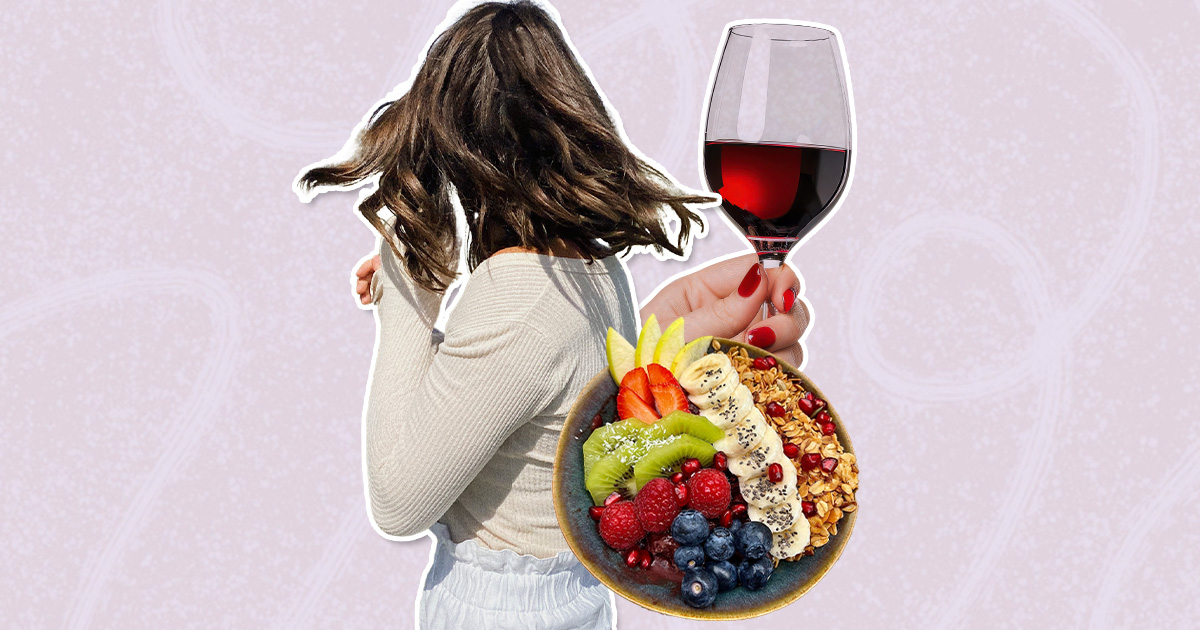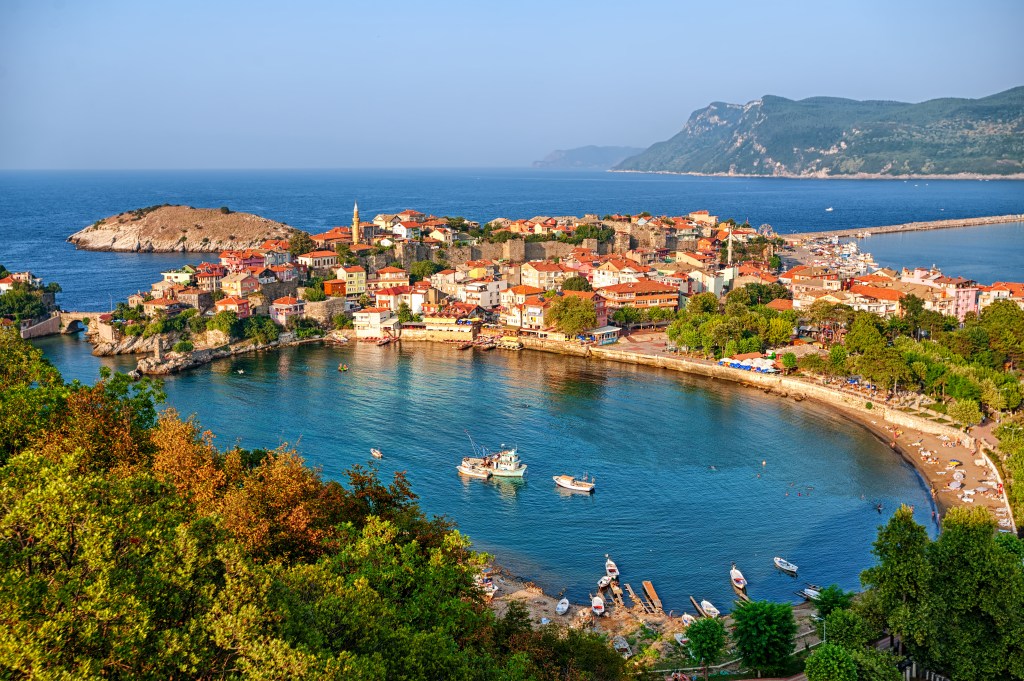I first heard about the Blue Zones (the five regions of the world where people consistently experience the greatest longevity: Okinawa, Japan; Sardinia, Italy; Nicoya, Costa Rica; Ikaria, Greece; and Loma Linda, California) from an episode of Down to Earth with Zac Efron where he visits Sardinia, Italy. I’ll admit, before learning about the Blue Zones, I wasn’t too concerned with living over 100 years old as a girl in my 20s, but once I learned that residents of the regions experience less disease, live healthier lives, and eat more carbs, I was officially intrigued (Efron’s involvement didn’t hurt either).
But, of course, how to live a long life with less sickness isn’t as simple as eating more pasta (if only)—or just your diet in general. Rather, Dan Buettner and his research team determined nine common lifestyle behaviors (AKA the Power 9) among the Blue Zone communities that explain why these populations are well outliving the rest of the world, not to mention having fewer symptoms, more energy, better mood, and less chronic disease. Read on for a list of the habits of the healthiest people in the world and how they can positively impact the quality of your life, no matter where you live.
1. Move more intentionally
You won’t find people from the Blue Zones in the gym running on the treadmill or setting aside 60 minutes a day to lift weights or take a Pilates class. Instead, movement is naturally woven into their lifestyles. Think: walking everywhere instead of driving, tending to a garden, or having an active career like a fisherman. They’re deliberately more active throughout the day, rather than dedicating a set amount of time to incorporate movement. While you may not be able to logistically walk to every destination or have the space to grow a garden, there are small ways you can add more natural exercise into your day: Park farther away from entrances so you have to walk farther, take the stairs instead of the elevator, or log some steps on your walking pad while answering emails. Also, rethink the way you use your free time. After a long day of sitting in front of your laptop, would a walk while catching up with a friend actually feel more rewarding than sitting on the couch watching TV?
2. Find your purpose
A long, healthy life comes down to more than just diet and exercise; what gives a person a sense of purpose in life is actually proven to be an important factor in longevity and optimal health. As Buettner explained, “Knowing your sense of purpose is worth up to seven years of extra life expectancy.” While Okinawans call it ikigai and Nicoyans call it plan de vida, it translates to the same concept: why you wake up in the morning. Having purpose can help you live with intention. You’re no longer just going through the motions; you’re actively pursuing something that brings meaning to your life.
Your purpose can be anything from finding a career that’s rewarding to traveling to experience different cultures to fighting for a cause you’re passionate about. If you’re unsure how to find your purpose, try exploring your human design, which guides you toward it based on your astrological chart. Also stepping out of your day-to-day routine and immersing yourself in new experiences like novel foods, hobbies, places, and subjects can provide direction. And if all else fails, ask yourself one simple question: “What would it take for me to live my most happy, fulfilling life possible?”
3. Determine ways to relieve stress—and prioritize them
Chronic stress leads to chronic inflammation and, according to Buettner, is associated with every major age-related disease. While Blue Zones inhabitants aren’t immune to stress, they certainly know how to handle it better than the rest of us. After a stressful work day, they don’t sit in front of the TV or continue to work until bedtime. Buettner shared that Okinawans take a few moments each day to remember their ancestors, Adventists pray, Ikarians take a nap, and Sardinians do happy hour—all very different routines that have the same outcome: relieve stress. It’s not about getting rid of stressors (they are a part of the human experience), but to know how to relieve the stress they cause, and then prioritizing those activities over everything else. Other proven methods of reducing stress include using certain eye movements, meditating, cold plunging, practicing affirmations, and boosting your everyday resilience.
4. Eat consciously and listen to your body
For longevity and a better quality of life, it’s not just about what you eat but how you eat. Those who live in Blue Zones “don’t count calories, take vitamins, weigh protein grams, or even read labels,” Buettner pointed out. “They don’t restrict their food intake—in fact, they all celebrate with food.” Blue Zone communities implement the 80% rule when eating, meaning they stop eating a meal when their stomachs are 80% full. And the amount of food they eat decreases as the day goes on: “People in the Blue Zones eat their smallest meal in the late afternoon or early evening and then they don’t eat any more the rest of the day,” Buettner explained.
In a society in which many of us were taught to eat our plates clean at the dinner table (clean plate club, anyone?), this can be a big adjustment. But practicing mindful eating and tuning into your body’s hunger and fullness cues can make all the difference. If you’re interested in trying this part of the Blue Zone lifestyle, make breakfast and lunch your biggest meals of the day, then eat a smaller dinner (hi, girl dinner) at least a few hours before you go to bed.
5. Incorporate more plants into your diet
You won’t hear people in Blue Zones referring to trendy diet labels like vegan or plant-based, but you will see plenty of vegetables and whole foods incorporated into their diet. For example, beans, including fava, black, soy and lentils, are one of the most prominent ingredients used in meals throughout all five regions. Blue Zone residents rarely eat meat, having it only about five times a month, and when they do eat meat, Buettner noted that it’s likely two ounces or less of pork, chicken, or lamb. This is not to say you should become an herbivore overnight, but avoiding processed meats, finding plant-based substitutes like tempeh and black beans, and designating a couple of days a week to enjoy meat or other animal-derived foods can help you supplement your diet with more plants. But, as always, do what feels best for you and listen to your body. If your body craves meat, give it what it’s asking for.
6. Drink a glass of wine regularly (in moderation)
Drinking is a common part of life in the Blue Zones and another key longevity factor they all (except Adventists) have in common. In fact, Buettner claimed that moderate drinkers live longer than non-drinkers. It’s important to note that we’re not talking about bottomless mimosas at brunch or tequila sodas every Friday night (sorry). Those in Blue Zones participate in drinking one to two glasses of local wine with friends or while eating dinner. For example, Sardinians are known for their daily consumption of the robust, regional red wine called Cannonau, which has two to three times the level of artery-scrubbing flavonoids as other wines.
The health benefits reaped are not just on account of the high level of polyphenols and antioxidants in the wine they drink, but also the way they consume it—it’s a daily practice of slowing down and enjoying good food with a close-knit community (more on that to come). While moderate alcohol consumption (especially with meals and friends) may lead to living longer, it’s not for everyone, so consult with your doctor before adding any alcohol consumption to your diet.
7. Practice a form of spirituality
The vast majority of centenarians (people who live to be over 100) Buettner interviewed belonged to some kind of faith-based community. Much like knowing your life’s purpose, having something larger than yourself to believe in and finding a community that shares the same belief system can help you live longer. According to Buettner, research shows that attending faith-based services four times per month will add 4-14 years of life expectancy, regardless of denomination. “People who pay attention to their spiritual side have lower rates of cardiovascular disease, depression, stress, and suicide, and their immune systems seem to work better, Buettner said. “To a certain extent, adherence to a religion allows them to relinquish the stresses of everyday life to a higher power.” This can look like joining a faith organization or other organized religious community, but it can also mean reading spiritual books to explore what resonates with you or finding a group of friends where you can discuss topics like purpose, grief, and belonging.
8. Put family and loved ones first
So often (arguably, too often), many of us put work commitments or other obligations first. Think about it: How many times have you postponed calling your mom back until after you’ve finished your to-do list, foregone a trip to visit a friend or relative because you were too busy or tired to make the effort, or put your career first even though you really wanted to seek a relationship? In Buettner’s research, centenarians undoubtedly put their loved ones first, and it’s essential to our health. For example, his research found that living with or near aging parents and grandparents can lower disease and mortality rates of children in the home and committing to a life partner can add up to three years to your life expectancy. While multigenerational living might not be a viable option, sharing openly with friends, spending quality time with elderly relatives, and engaging in shared activities with your SO are. After all, the only purpose of having a longer life is to have more time with the people you love.
9. Have a positive social circle
Having a strong community is essential; loneliness is a key factor for poor health. People in the Blue Zones have this figured out, each having a system or community in place to ensure that everyone has lasting, fulfilling, and deep friendships. For example, Okinawans created a system called moais, or groups of five friends they are born into and who are committed to each other for life. This ensures that everyone had a deep community and strong connection, rather than just surface-level friendships. And they spend more time with this social circle than they spend with strangers, coworkers, etc.
But it’s not just about having any social circle, but having a positive one. You’ve probably heard that you’re the product of the five people you hang out with the most. Every Blue Zone community chooses or is born into social circles that support healthy behaviors. Research from Framingham Studies shows that smoking, obesity, happiness, and even loneliness are contagious. In other words, if you surround yourself with unhealthy, unhappy people, you are more likely to be unhappy and unhealthy. But if you surround yourself with happy, healthy people, you are more likely to be happy and healthy. If you’re having trouble finding like-minded, positive people to spend quality time with, consider joining groups based on healthy habits such as a book club or a group exercise class.
ABOUT THE AUTHOR
Christine Winder, Contributing Wellness Writer
Christine is a long-time reader turned contributing writer for The Everygirl. She has a BA in Communications from Roanoke College and lives with her two cats in Richmond, VA where she writes for several local publications.


